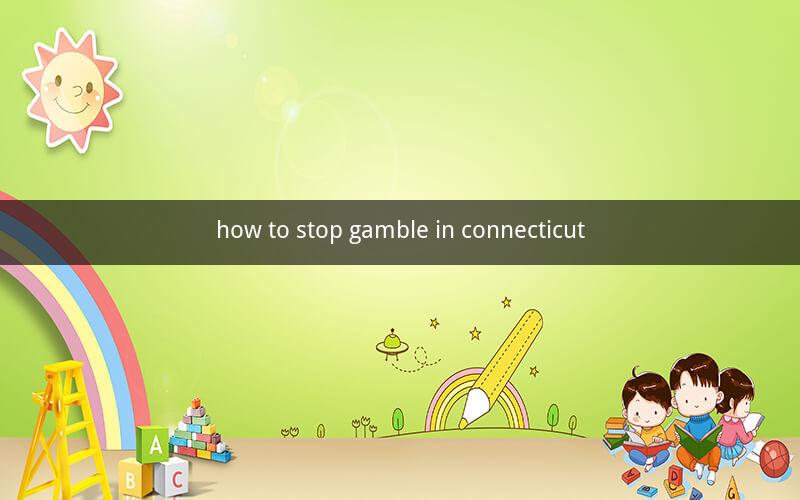
Table of Contents
1. Understanding Gambling Addiction
2. Identifying the Signs of Problem Gambling
3. The Role of Support Systems in Connecticut
4. Legal Measures to Curb Gambling
5. Therapeutic Approaches to Gambling Addiction
6. Self-Regulation Techniques
7. Community Resources and Support Groups
8. The Impact of Gambling on Mental Health
9. The Economic Consequences of Problem Gambling
10. Case Studies and Success Stories
---
1. Understanding Gambling Addiction
Gambling addiction, also known as problem gambling or compulsive gambling, is a serious condition that affects individuals' ability to control their urge to gamble. In Connecticut, the issue has gained significant attention due to the presence of numerous casinos and gambling facilities. Understanding the nature of this addiction is the first step towards addressing it effectively.
2. Identifying the Signs of Problem Gambling
Recognizing the signs of problem gambling is crucial in initiating the process of recovery. These signs include:
- Feeling the need to gamble more and more money to achieve the same thrill.
- Feeling restless or irritable when trying to cut down or stop gambling.
- Gambling to escape problems or relieve unpleasant feelings.
- Missing work or school to gamble.
- Lying to family or friends about gambling activities.
- Using money meant for bills or other important expenses to gamble.
- Borrowing money to finance gambling activities.
3. The Role of Support Systems in Connecticut
Connecticut offers various support systems to help individuals struggling with gambling addiction. These include:
- Counseling services provided by mental health professionals.
- Self-help groups like Gamblers Anonymous.
- Online resources and hotlines for confidential support.
4. Legal Measures to Curb Gambling
The state of Connecticut has implemented several legal measures to prevent problem gambling. These include:
- Age restrictions for gambling activities.
- Limits on the number of gambling facilities.
- Regulations on the advertising and marketing of gambling services.
5. Therapeutic Approaches to Gambling Addiction
Therapeutic approaches to gambling addiction include:
- Cognitive-behavioral therapy (CBT) to change negative thought patterns and behaviors.
- Family therapy to address the impact of gambling on relationships.
- Supportive therapy to provide emotional support and guidance.
6. Self-Regulation Techniques
Individuals can employ self-regulation techniques to control their gambling habits. These include:
- Setting a budget for gambling activities.
- Creating a gambling schedule and sticking to it.
- Using tools like self-exclusion to prevent access to gambling facilities.
7. Community Resources and Support Groups
Connecticut has numerous community resources and support groups dedicated to helping individuals with gambling addiction. These include:
- Local counseling centers.
- Nonprofit organizations specializing in gambling addiction.
- Online forums and chat rooms for peer support.
8. The Impact of Gambling on Mental Health
Gambling addiction can have severe mental health consequences, including:
- Depression and anxiety.
- Substance abuse.
- Relationship problems.
- Suicidal thoughts and behaviors.
9. The Economic Consequences of Problem Gambling
Problem gambling can lead to significant economic consequences, such as:
- Financial ruin.
- Loss of employment.
- Legal problems.
- Increased debt.
10. Case Studies and Success Stories
Several case studies and success stories illustrate the effectiveness of various approaches in treating gambling addiction. These stories serve as inspiration and hope for individuals struggling with this condition.
---
Questions and Answers
1. What are the common risk factors for developing gambling addiction?
- Common risk factors include a family history of addiction, exposure to gambling at an early age, and certain personality traits like impulsivity and thrill-seeking.
2. How can a person determine if they have a gambling problem?
- A person can determine if they have a gambling problem by assessing their gambling behavior against the signs of problem gambling listed earlier.
3. Are there any medications available to treat gambling addiction?
- While there are no medications specifically designed to treat gambling addiction, certain medications may be prescribed to manage symptoms of co-occurring mental health disorders.
4. What is the difference between problem gambling and pathological gambling?
- Problem gambling is characterized by some negative consequences, whereas pathological gambling is a severe form of problem gambling with more severe negative consequences and an inability to control gambling behavior.
5. Can gambling addiction be cured?
- While there is no cure for gambling addiction, it can be effectively treated and managed through various therapeutic and self-help approaches.
6. How can a person find a reputable gambling counselor in Connecticut?
- Individuals can find reputable gambling counselors by contacting local mental health agencies, visiting the Connecticut Department of Consumer Protection website, or reaching out to support groups like Gamblers Anonymous.
7. What is the most effective treatment for gambling addiction?
- The most effective treatment for gambling addiction varies from person to person, but a combination of cognitive-behavioral therapy, support groups, and self-help techniques tends to be most effective.
8. How can family and friends support someone struggling with gambling addiction?
- Family and friends can support someone struggling with gambling addiction by offering unconditional love and support, encouraging them to seek help, and being educated about the condition themselves.
9. What is the average duration of treatment for gambling addiction?
- The duration of treatment for gambling addiction can vary widely, but most individuals require several months to a year of therapy and support.
10. Can problem gambling lead to physical health issues?
- Yes, problem gambling can lead to various physical health issues, including stress-related conditions, heart disease, and other health complications resulting from financial and emotional stress.